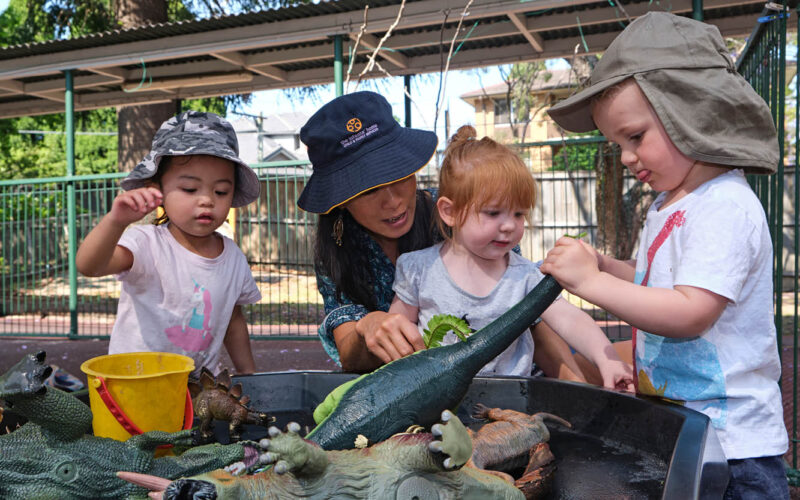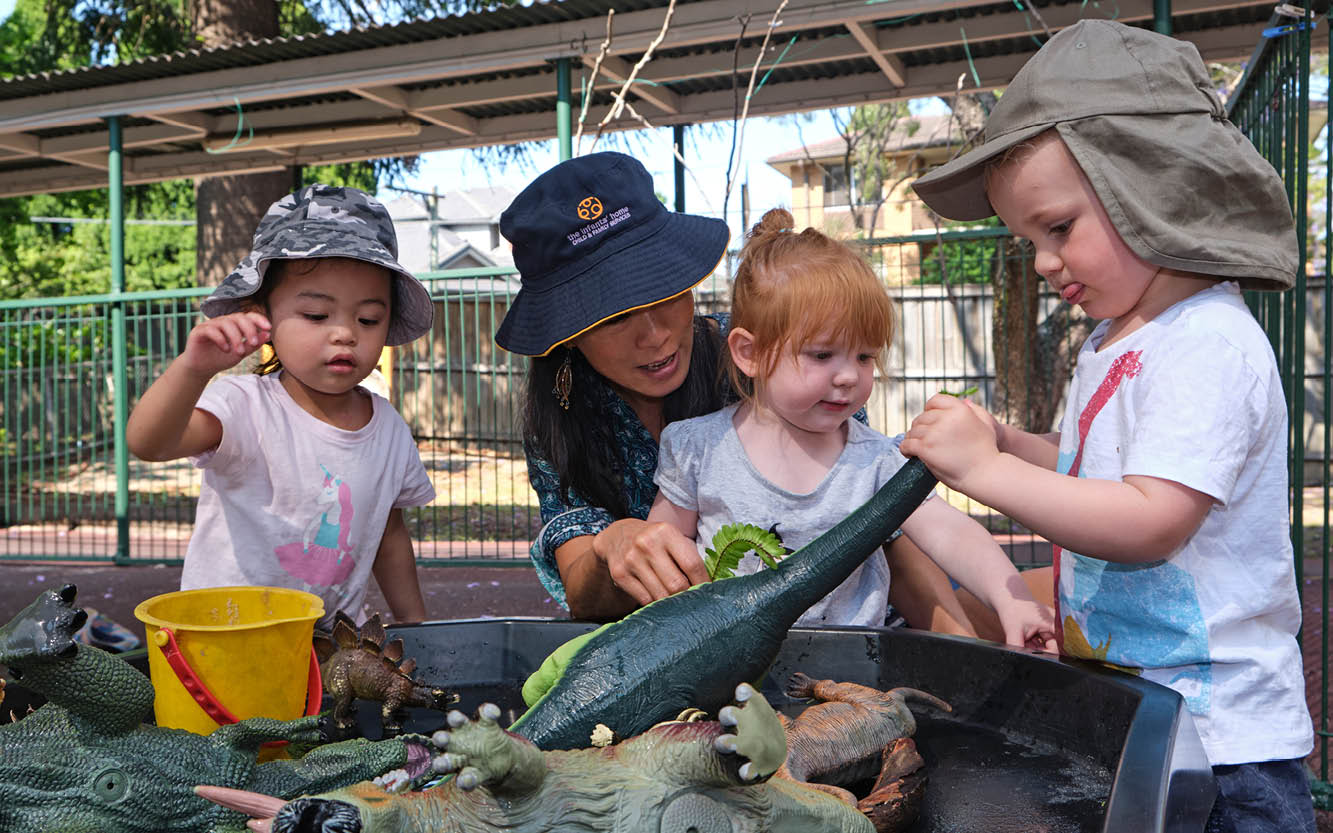

As they navigate their world, young children experience a wide range of emotions, often with intensity. When these big feelings become overwhelming, children can ‘act out’ through physical behaviors such as crying, shouting/screaming, being aggressive, falling to the floor or running away. This is because they have not yet developed the cognitive, communication, social and emotional skills to express their needs and feelings rationally or effectively, or to calm themselves on their own. A young child’s brain is not yet wired to ‘self-regulate’—they primarily experience and react to the world through their emotions.
Every child develops differently, and many children can become overwhelmed by their big feelings at times. Apart from age and development, there are many other triggers that can cause big feelings in children.
What causes big feelings in children?
Younger children, and children with developmental delays, may become frustrated or distressed when they do not have the communication skills to express their needs or feelings, including the desire to do things for themselves. Younger children may also want things that they may not yet intellectually understand are impossible or unsafe, for example not wanting to hold an adult’s hand when crossing the road.
At times, the cause for a young child’s big feelings may seem inconsequential or unreasonable to an adult, for example becoming upset when their toast is cut into squares rather than triangles). It is important to remember that big feelings are often part of a child’s developing sense of agency, and that what may seem trivial to an adult is important to the child.
There are many other factors that can trigger or contribute to children’s big feelings, including:
- Their individual temperament
- Feeling stressed, hungry, thirsty, tired or physically uncomfortable (eg too hot or cold)
- Being overstimulated
- Being physically unwell
- Big changes in their world, such as moving house or having a new sibling
- Being fearful, worried or embarrassed
- Being unsure of boundaries, especially when these are inconsistent
- Being required to behave in a way that is not developmentally appropriate for them, eg asking a young toddler to share a favourite toy with another child.
It is important to remember that children do not ‘choose’ to have big feelings or to be overwhelmed by these. Having a ‘tantrum’, ‘meltdown’ or ‘losing it’ is not a deliberate strategy to ‘get their own way’. Children want to avoid these feelings as much as their parents and carers do!
Tips to support children’s developing emotional regulation skills
Being overwhelmed by big feelings is a normal part of a child’s development. However, the following suggestions can help to minimise the frequency and/or intensity of these for your child as they develop their emotional regulation skills:
- Help your child begin to understand and name their emotions. You can do this from birth by using words to label your child’s feelings, and those of other people. Reading stories about emotions, such as The Colour Monster by Anna Llenas, and talking about the emotions of characters in books, movies and TV shows can also help build your child’s awareness of emotions.
- Become attuned to the physical or non-verbal signs that your child is beginning to feel emotionally overwhelmed and, if possible, intervene or distract your child before the situation escalates
- Help your child to recognise how their body feels when they are experiencing a strong emotion eg “You look angry. Do your hands feel tight/Does your tummy feel growly?”
- Support your child’s physical wellness by helping them to get enough rest/sleep and to have regular meals, healthy snacks and drinks
- Maintain consistent routines and boundaries for your child
- Get to know specific things that may trigger your child’s big feelings and plan to manage these, for example, keeping time in noisy/busy environments to a minimum or making sure you have healthy snacks on hand when you are away from home
- Spend unhurried time playing with your child and doing fun things with them when they are calm
- Talk and read with your child to help them to develop their verbal communication skills
- For children with limited or no verbal communication skills, help them learn other ways to communicate their needs or wants, for example by pointing or using visual supports (eg objects, photographs, signs or pictures)
- Consider whether you really need to say “no” to a request your child makes—while consistency is important, it may be that what they want is not actually an unreasonable request to meet
- Allow your child to have some independence or control when appropriate, for example, letting them choose which healthy food to eat at snack time or which book they want to read
- Role model your own calm responses to frustrating or upsetting situations, for example, “Oh, I really wanted to buy some apples, but there are none here. I like grapes, so I’ll get some of those instead.”
Tips for managing big feelings when they happen
Regardless of what you do to minimise them, your child is likely to experience outbursts of big feelings on occasion. Strategies for managing this when it occurs include:
- Wherever possible, stay calm and rational and use a quiet, soothing voice to acknowledge the emotion they’re feeling, for example, “I know you’re really upset because we can’t go to the park today”
- Don’t try to reason with your child or to ‘talk them down’ while they are experiencing a big emotion
- If your child or others are not safe, you may need to lead or carry your child to safer space
- Stay with or near your child until they calm down and, if it soothes them, touch them reassuringly, for example, rub their back gently and/or hold them
- Some children prefer to have physical space when they’re upset, so if this is the case, position yourself where you can still see your child and they know you’re nearby
- Give your child the time they need to calm down (it may take some time)
- Once the big feeling has passed, acknowledge the emotion your child was feeling, and reassure them that they are ok. Your child needs to know that you still love them and are there to help them when they have big feelings that they can’t regulate on their own.
When you use warm, calm and responsive interactions to help your child to settle themselves during a big feeling episode, you are essentially ‘co-regulating’. This helps your child to develop the skills and strategies they need to be able to self-regulate in the future.
Managing your own feelings and wellbeing
Seeing your child experiencing a big feeling episode is often stressful and overwhelming, and maintaining your own sense of calm can be difficult. It can help to:
Be prepared and plan for how you will respond if your child becomes upset
- Use self-calming strategies such as deep breathing, clenching then relaxing parts of your body, stretching, squeezing a stress ball
- Try to keep in mind that this is a normal part of your child’s development and that they are not ‘doing this to you’ deliberately
- Remember that having big emotions is as distressing, if not more so, for your child as it is for you.
Conclusion
If you are worried that your child’s big feelings are excessive or are adversely affecting their everyday lives and wellbeing, you may wish to consider seeking professional support. Your family GP may be able to provide further information and referral if needed.
Contact us
If you have any questions or would like more information, please email us at childrensservices@theinfantshome.org.au.
References and Further Reading
- Better Health Channel. (2024). Tantrums. Retrieved from https://www.betterhealth.vic.gov.au/health/healthyliving/tantrums
- Raising Children Network. (2024). Tantrums: why they happen and how to respond. Retrieved from https://raisingchildren.net.au/toddlers/behaviour/crying-tantrums/tantrums
- The Circle of Security International. (2016). The Balance of Being-With. Retrieved from https://www.circleofsecurityinternational.com/2016/04/15/the-balance-of-being-with/